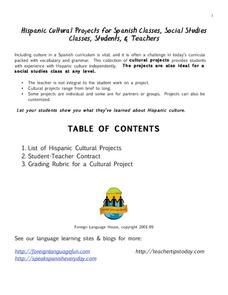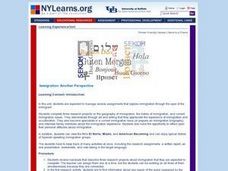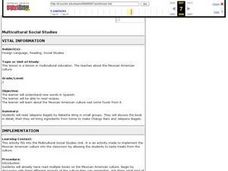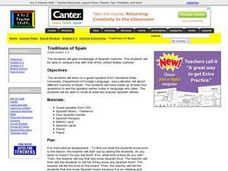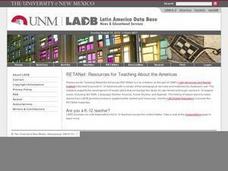Foreign Language House
Hispanic Cultural Projects
Invite your pupils to educate themselves on the culture in various Spanish-speaking countries through a series culture-related projects. The resource includes a series of individual and group projects for learners to choose from as well...
Curated OER
FOOD FOR THE ANCESTORS
Students identify the foods associated with the "Days of the Dead Celebration." They compare and contrast these foods to the foods associated with American celebrations and become familiar with the foods of Mexico and their relationship...
Curated OER
Immigration: Another Perspective
Students research the geography and history of immigration and then take a look at current immigration issues. They prepare biographies, conduct interviews, view films, sample foods, prepare an oral presentation, complete worksheets and...
Curated OER
My World Wide Tour of Spanish Speaking Countries
Young scholars organize a two week travel plan through Spanish speaking countries all over the world. plan their flight schedules, accommodations, and tours of cultural events. Students compute the total cost of their trip.
Curated OER
Multicultural Social Studies
Second graders read and discuss the book "Jalapeno Bagels" in order to explain the Mexican American culture.
Curated OER
Traditions of Spain
Students examine the different Spanish customs. They compare and contrast customs found in the United States verses those found in Spain. They participate in a game in Spanish over what they have discovered from the lesson.
Curated OER
Ecuadorian Highlands Lesson
Indigenous peoples resided in the highlands of Ecuador as far back as 5,000 B.C. To learn about the lives of these people, class pairs research the farming and the building methods, the arts and crafts, and the beliefs of the early...
Curated OER
Different Ethnic Groups in Ecuador, Panama and Argentina: Their Assimilation and their Contributions
Students research various Latin American countries and reflect on the different ethnic communities represented in that country and their contributions to the region. They make posters, perform skits and write letters about their research.


